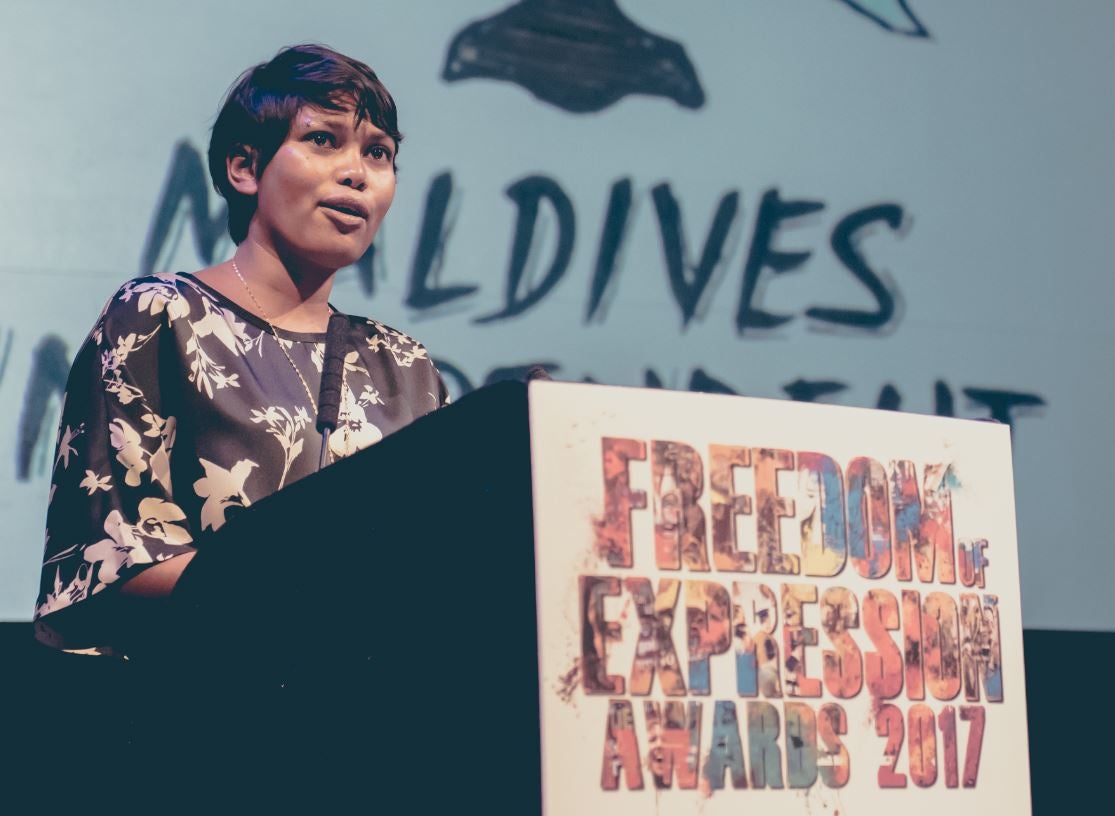
On World Press Freedom day (2/5/2017) Press Gazette highlights the repression suffered by journalists working in The Maldives (listen to this interview as a podcast)
The Maldives is known to most Britons mainly as an exotic holiday destination.
But is also a place where journalists face the risk of imprisonment and even death for reporting the truth.
Reporters Without Borders ranks the country, which has a population of 400,000, 117 out of 180 in the world for press freedom.
Since the 2012 coup d’état the Maldives government has sought to control the media and most recently, in August 2016, passed a law criminalising defamation.
The Maldives Independent is a news website which provides one of the few remaining independent sources of news in the country.
Last month it won the journalism prize at the Index Freedom of Expression Awards in London.
It started in 2004, in exile in Sri Lanka, to cover the pro-democracy protests which were at that time taking place in the country, at a time when all media was state controlled.
Editor Zaheena Rasheed came to London to pick up the prize which she described as a “lifeline” which has “has renewed and strengthened our resolve to continue reporting”.
She told the Press Gazette Journalism Matters podcast: “The website was set up with goal of letting the world know what was happening there. With no wire services and very few diplomatic missions, there was an information blackout.
“We have a massive human rights focus because of that.
“The past couple of years have been very challenging. We lost a member of our team, the office was attacked, we’ve received death threats and nearly every member of our team has been arrested at least once.”
Colleague Ahmed Rilwan has been missing now for more than 1,000 days. The 28-year-old wrote about criminal gangs, Islamic extremism and politics and was last seen being forced at knifepoint into a vehicle outside his house.
Rasheed said: “He had only been working for us for about eight months. A writer, blogger, and prolific tweeter, known for his incredible humour. The groups that felt the wrath of his humour were extremists or radicalised individuals.
“We believe radicalised gangsters were involved in the abduction. We did everything we could to highlight the issue but there was absolutely no help from state. Police refused to acknowledge the abduction despite witnesses.”
On April 23 this year, liberal Maldives blogger Yameen Rasheed was found knifed to death. His website, The Daily Panic, poked fun at the country’s political establishment.
In 2012, another blogger, Ismail Rasheed, narrowly escaped death after having his throat slashed. He said he was attacked because he advocated secularism in his writing.
In September 2016 the Maldives Independent’s office was raided by police, after the release of an Al Jazeera documentary exposing government corruption that contained interviews with Rasheed, who had to flee for her safety. The raid was prompted by claims the publication was involved in a conspiracy to topple the Government.
She continued to edit the title from exile and has now left it to start a new job with Al Jazeera in Qatar.
Funded by donors, the Maldives Independent has a team of six journalists.
Rasheed said: “Things are very bad for Maldives press right now.”
An opposition TV station was recently fined $130,000 for broadcasting a speech by an opposition politician questioning the achievements of the current president.
Under the criminal defamation law, non-payment of such a fine could lead to journalists being jailed and a news outlet being shut down.
Asked why she continued to work as a journalist after the disappearance of her colleague and in the face of personal threats, Rasheed said: “I’m not the only Maldivian journalist who has had death threats or been intimidated or harassed. TV stations have been torched.
“I’ve been insprised by the courage of my colleagues.
“Also I was 21 when I voted in the first multi-party elections in Maldives [in 2008]. To see how a society flourishes with free speech was amazing. I don’t want to see those gains being lost.”
She added: “The email from Index came at one of my lowest points. I’d been in exile for six months and there were questions about our continued funding. It was the closest I’d ever come to giving up.
“It showed that people care and we are doing important work. The fellowship – a year for assistance – means we don’t feel so alone anymore and it renews our resolve to keep reporting.”
Email pged@pressgazette.co.uk to point out mistakes, provide story tips or send in a letter for publication on our "Letters Page" blog
